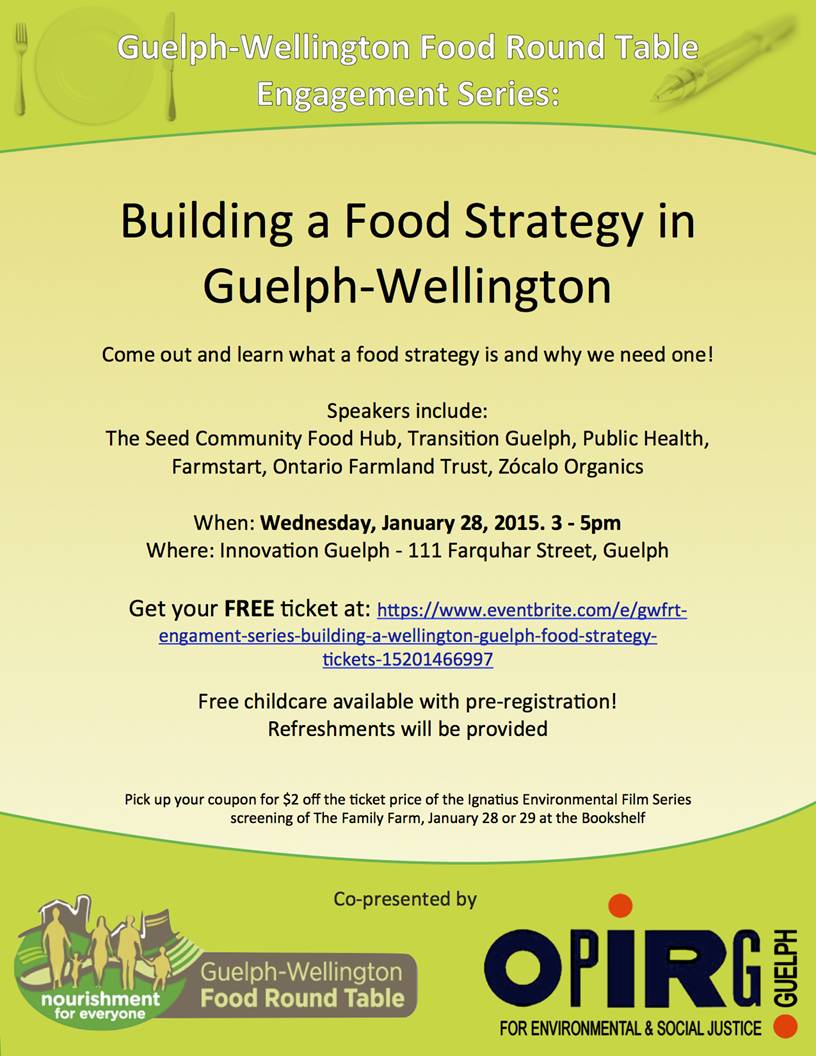First posted April 8, 2014 on the website of the Guelph Wellington Task Force for Poverty Elimination
Blog post by Erin Nelson
Erin is a Postdoctoral Fellow at the University of Guelph School of Environmental Design and Rural Development and a Seed Community Food Hub Committee Member
For someone like me, who thinks food hubs are really great, it has been an exciting couple of weeks. First, I was able to attend a food hub conference in North Carolina where I met people from the Community Food Bank of Southern Arizona, Rochester New York’s Foodlink, the Food Bank of East Alabama, and the Oregon Food Bank. These organizations are part of a growing movement to transform food banks into places that provide good, healthy food, while at the same time working to build thriving community food systems and fighting the root causes of food insecurity. Hearing the stories of how these four food banks have reimagined their role in the community, and have become places that represent empowerment, learning, and even celebration, was incredibly inspiring.
I brought that inspiration back with me to Guelph, where there has been growing momentum for a local project modeled on the kind of work I saw happening in the United States, and on the vision of Community Food Centres Canada. (Incidentally, when the folks in the U.S. heard that I was part of a project connected to Community Food Centres Canada, they treated me like I was a bit of a rock star. This had nothing to do with me, and everything to do with the fact that CFCC founder Nick Saul is a genuine hero to people trying to shift the way we address hunger in our communities. If this shift interests you at all, I highly recommend his book The Stop: How the Fight for Good Food Transformed a Community and Inspired a Movement.)
Back to Guelph, and our local community food security story. At the end of January, more than 100 people gathered at Dublin Street United Church for an Open Space workshop to brainstorm ideas for The Seed Community Food Hub. There was so much energy and enthusiasm in the room that day you could almost reach out and touch it. On April 4th, a smaller group of dedicated Seed supporters got together at the Guelph Community Health Centre to take things a step further. Using the fabulous ideas that were generated by the Open Space(as well as other research and community consultation results), we started building a solid action plan to get The Seed off the ground.
The workshop was facilitated by Taylor Newberry Consulting’s Jaime Brown, who began the day by telling the story of The Seed’s development, from 2009 to today. Then we all got to work on the action planning that will help us write the next chapter of The Seed story together. People in the room represented many different community groups and organizations, including the Poverty Task Force, the Guelph-Wellington Food Round Table, Community Voices, the Guelph Neighbourhood Support Coalition, the United Way, the Upper Grand District School Board, Wellington-Dufferin-Guelph Public Health, the City of Guelph, the University of Guelph’s Research Shop, Farm-to-Fork, the Appleseed Collective Revival and many more. We were particularly lucky to have Elizabeth Fraser in the room, who shared a wealth of knowledge and expertise based on her years of experience working at Community Food Centres Canada. We were also grateful for a delicious lunch provided by local caterer Terra et Silva.
By the end of the day, lots of ideas had been collected and organized focusing on key priorities like finding a location, securing funding, and building programs. The Seed Committee will spend the next few weeks pulling these ideas together and integrating them into the work that it has already done. Then, action groups can really start digging into these activities and preparing the ground for The Seed to be planted.
If I felt inspired after hearing the stories of our American counterparts, I felt even more so after Friday’s Seed planning day. At its core, the vision of The Seed – and organizations like it – is about the power of food to build community. Even before it has opened its doors, that’s exactly what is already happening. A few weeks ago, as I was walking in downtown Guelph, I saw somebody I didn’t recognize wearing a Seed button, and it put a huge smile on my face. We later chatted, and he told me that he loves the idea of The Seed but for now can only support it by wearing the button. That kind of support is invaluable! If you’d like to see more Seed buttons around town, or would like to be involved in any way in the building of The Seed, please contactinfo@gwpoverty.ca (or find someone around town wearing the logo on their jacket and say hi!).

